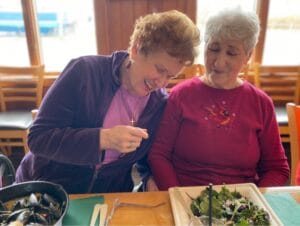When we’re younger, we think we’re invincible. We may eat sugary foods and deep-fried delicacies, not realizing that they may be some of the worst foods for memory loss.
When we’re older, if we continue to eat these foods, they can take a toll on our bodies. But, how are we supposed to know which foods help and which are harmful for brain health?
What are the 5 worst foods for memory loss?
And what about the principle of “everything in moderation”? Where does that fit in?
Village Walk here: we get it. Understanding which foods and drinks are healthy — and harmful — for brain health can be challenging.
But we stay up to date on current studies on food and the brain. And we have good news for you.
You can maintain a healthy and active brain by eating the right foods and practicing the right habits.
If you’re wondering what the worst foods are for memory loss and the brain, we have you covered. We’ll dive into some of the most awful, sugary, and fatty foods on this planet to avoid — as well as healthy habits to nurture as you move into your Golden years.
Here are the 5 worst foods for memory loss.
The link between diet and memory loss
While there’s no concrete evidence suggesting that diet can prevent memory loss-related conditions like Lewy body dementia, diet can certainly help with slowing the progression of memory loss and progressing through the seven stages of dementia.
With that being said, scientific research has shown us that activities, foods, and habits that boost brain health can help you live longer. On the topic of food, eating a diet with nutrient-rich foods that are low in trans fats and processed sugars can help people boost brain health and longevity.
The 5 worst foods for memory loss
While moderation is key with any food, some foods are worth avoiding as much as possible. The following foods typically are more harmful than healthy for cognitive functioning. These foods should be avoided as much as possible.
Artificial sweeteners
Artificial sweeteners like saccharin and aspartame — often found in sugary drinks and chewing gum — can trigger inflammation in the brain and therefore damage it. Damage to the brain means a greater likelihood for potential cognitive deficits in the future.
High-fructose corn syrup (HFCS)
Alas, many store-bought foods contain high-fructose corn syrup (HFCS) — another no-no food on our list. Eating large quantities of foods containing HFCS can lead to obesity, a risk factor for memory loss.
Worst of all, consuming large quantities of desserts, candies, and other processed foods that are high in HCFS can influence the insulin levels in our bodies. Insulin resistance is a risk factor for cognitive decline for those who live with conditions like obesity and diabetes.
Trans fats
Often found in butters, baked goods, and frozen entrées, trans fats can cause inflammation in the brain and disrupt the blood flow needed for healthy brain functioning. Eating large amounts of trans fats can cause buildups of beta-amyloid proteins.
In fact, many people with abnormal levels of beta-amyloid protein build-ups live with Alzheimer’s. If the disease progresses to an unhealthy level, these people might need in-home dementia care or caregiver support from an accredited assisted living or care facility.
Alcohol
While drinking alcohol in moderation isn’t harmful, drinking large amounts of alcohol can lead to memory loss. That’s because alcohol can hinder the brain in remembering information.
Aside from memory loss, excessive alcohol consumption can lead to a variety of physical conditions and other mental health problems such as depression and anxiety.
High-sodium-based foods
Potato chips, canned foods, salted and dried meats, and certain beverages can also lead to high blood pressure. High blood pressure can affect the blood vessels in the brain and lead to cognitive decline and memory loss.
Bonus food and drink: Fried foods and diet sodas
We thought we’d finish off our list of the 5 worst foods for memory loss with one more food category: fried foods like doughnuts, french fries, and chicken tenders. Like high-sodium foods, fried foods cause inflammation which can damage blood vessels.
Damaged blood vessels can potentially lead to cognitive decline and memory loss.
What’s more, diet sodas can also be harmful for memory loss. Drinking multiple cans of soda laden with artificial sweeteners can lead to conditions that can affect the health of the brain.
In other words, think twice before you sip a sugary carbonated beverage.
Food, drinks, and activities that help boost memory (and brain health)
No list of unhealthy foods would be complete without ending on a positive, high note. Here are some foods, drinks, and activities that help boost memory and brain health.
Fruits and veggies
Just like Mom and Dad used to say as a child, “Eat your fruits and veggies!” It’s true.
Fruits and veggies are chock full of antioxidants and nutrients that have an anti-inflammatory effect on the brain. Examples of fruits and veggies which are healthy for the brain include:
- Blueberries
- Avocados
- Beets
- Kale and spinach (and other leafy greens)
- Citrus fruit
Whole grain foods
Brown rice, whole oats, couscous, quinoa, and whole-grain bread are great for the brain. Instead of increasing glucose at an alarming rate the way white bread, white rice, and other sugary foods do, whole grain foods release glucose at steady rates.
Whole grain foods include complex carbohydrates which the brain needs to maintain health and strength.
The slow release of glucose to the brain is a much healthier alternative than foods like white bread and other sugary foods.
Fish containing omega-3 fatty acids
Fish is great for brain health. But, only specific fish.
Fatty fish — like salmon, herring, light tuna, and mackerel — contain omega-3 fatty acids that may reduce inflammation in the brain and increase neurotransmitter functioning.
Avoiding highly processed meats, fatty meats, and other meats high in saturated fat can help you continue to keep your brain healthy well into old age.
Table: The worst and best foods for memory loss
| Worst foods for brain health | Best foods for brain health |
| 1. Artificial sweeteners 2. High-fructose corn syrups (HFCS) 3. Trans fats 4. Alcohol 5. High-sodium-based foods | 1. Fruits and vegetables 2. Whole grain foods 3. Fatty fishes high in Omega-3 fatty acids |
Did you know?
Did you know Village Green hosted our Spring Open House? It was a great day that was joined by our professional partners along with some new friends.
The food and live music were amazing. Thank you everyone that stopped by.
Take a look at some of our irresistible fanfare here.
Live your best life with a Village-sized community
In summary, the 5 worst foods for memory loss and brain health include:
- Artificial sweeteners
- High-fructose corn syrup (HFCS)-laden foods
- Trans fats
- Alcohol
- High-sodium-based foods
In contrast, eating a nutrient-rich diet full of fruits and veggies, whole grain foods, and omega-3 fatty acids can help boost brain functioning and keep you living healthy and well into your golden years.
But diet alone won’t cut it. Living healthy in mind and body requires community and village-wide support.
At Village Green, we provide comprehensive and compassionate assisted living and memory care solutions in the heart of the hamlet of Levittown, NY. Whether you’re an 80-year-old looking to live a healthier life or are ready to transition out of skilled nursing and back into assisted living, the team at Village Green is here for you.
Contact one of our friendly and knowledgeable assisted living care staff to learn more about what our Village can do for you.
Frequently asked questions about food and memory loss
How are food and memory loss connected?
Food and memory loss are related in the sense that foods high in sugar, trans fats, artificial sweeteners, and high-fructose corn syrups can cause inflammation in the brain. The inflammation caused by these foods may influence cognitive functioning, which can potentially lead to memory loss.
Foods that can help improve memory include the following:
- Fruits and vegetables
- Fatty fishes full of omega-3 fatty acids
- Whole grain foods
- Nuts, legumes, and beans
- Foods with monounsaturated fats like olive oil
What does assisted living and memory care have to do with food and memory loss?
Fortunately, memory care and assisted living communities are situated to provide fresh, nutritious, and gourmet meals three times a day to assisted living and memory care residents.
Chefs at memory care and assisted living communities are trained and certified to provide only the most wholesome, nourishing, and healthy food for seniors.
At Village Green, our culinary experts have perfected the art of healthy dining in a way that nurtures mind, body, heart, and soul. To get a sneak peek at what we often serve at our facility, click here.
“Loving the meals… she’s eating well again.”
”My 83-year-old mom recently moved into Village Green at Levittown after living in the same house for 61 years. Living on her own had become extremely difficult due to physical limitations…she was a nervous wreck, and so was I!
I am so pleased to say the staff at Village Green have been outstanding! Every single person we’ve dealt with has gone out of their way to make this a very smooth transition, and to make mom feel welcome and she is setting in nicely.
Beautiful facility, like living in a hotel but with lots of help all around. She’s been loving the meals, so she’s eating well again, and her overwhelming list of meds and diabetic regimen is being handled by a great staff of nurses.
We couldn’t be happier!” – Maureen O, grateful Village Green family member




